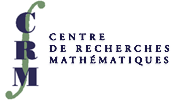 |
|
||||
- CARL COWEN, I U P U I
Spectral Picture for Some Composition Operators [PDF]
-
If $\phi$ is an analytic map of the disk into itself and $H$ is a Hilbert space of analytic functions on the disk, the composition operator $C_\phi$ is the operator given by $C_\phi f= f\circ\phi$ for $f$ in $H$.
In this talk, we will discuss the point spectrum of $C_\phi^{\textstyle\ast}$ on $H^2$ when
$\phi(0)=\phi'(0)=0$ or more generally, when $\phi$ has a fixed point in the open disk,
but $\phi$ is not locally univalent there. The (power-)compact case is easy:
\[ \sigma( C_\phi^{\textstyle\ast}) =\sigma_p( C_\phi^{\textstyle\ast})=\{0, 1\} \]
In her recent thesis, Maria Neophytou used work of Poggi-Corradini and the speaker to show that for a broad class of such composition operators, the point spectrum of $C_\phi^{\textstyle\ast}$ is an open disk centered at the origin with radius $1/\sqrt{\phi'(b)}$ where $b$ is a fixed point of $\phi$ on the unit circle such that \[ \phi'(b)= \min \{ \phi'(c) : c \mbox{ is a fixed point of $\phi$ with $|c|=1$} \} \] Her proof will be outlined and a conjecture will be offered.
- PAUL GAUTHIER, Université de Montréal
Hypercyclicity of the Riemann zeta-function for the composition operator $C_i(f)(z)=f(z+i).$ [PDF]
-
For a non-zero complex number $a$ let $\phi_a(z)=z+a$ and $C_a$ be the associated composition operator $C_a(f)=f\circ\phi_a.$ The operator $C_a$ is hypercylic on the space of entire functions. That is, there is an entire function $f$ such that $\{C_a^n(f):n\ge 0\}$ is dense in the space of entire functions (Birkhoff). Bagchi has shown that the Riemann zeta-function is in fact frequently hypercyclic for the vertical composition operator $C_i$ on the space of zero-free holomorphic functions in the strip $\{z:1/2<\Re z<1\}.$ Removing the zero-free hypothesis violates the Riemann hypothesis. We discuss a recent observation by J. Andersson relating these questions to an interesting question on polynomial approximation.
- GORDON MACDONALD, University of Prince Edward Island
Composition Operators on the Newton Space [PDF]
-
We investigate properties of composition operators $C_\phi$ on
the Newton space (the Hilbert space of analytic functions which
have the Newton polynomials as an orthonormal basis). We derive a
formula for the entries of the matrix of $C_\phi$ with respect to
the basis of Newton polynomials in terms of the value of the
symbol $\phi$ at the non-negative integers. We also establish
conditions on the symbol $\phi$ for boundedness, compactness,
and self-adjointness of the induced
composition operator $C_\phi$. A key technique in obtaining these
results is use of an isomorphism between the Newton space and
the Hardy space via the Binomial Theorem.
(Joint work with Peter Rosenthal.)
- JAVAD MASHREGHI, Universite Laval
Composition operators on subspaces of $H^2$ [PDF]
-
Let $b$ be in the closed unit ball of $H^\infty$. In this case, the Toeplitz operator $T_b$ is simply the multiplication by $b$ on $H^2$. Then the $\mathcal{H}(b)$ space is defined to be the image of operator $(Id-T_bT_b^*)^{1/2}$, endowed with the scalar product
\[
\langle\, (Id-T_bT_b^*)^{1/2}f, \, (Id-T_bT_b^*)^{1/2}g \,\rangle_{\mathcal{H}(b)}=\langle f,g\rangle_{H^2},
\]
where $f,g\in (\hbox{ker}(Id-T_bT_b^*)^{1/2})^\perp$. This is a Hilbert space which is contractively contained in $H^2$. If $b=\Theta$ is inner, then $\mathcal{H}(\Theta)$ is a closed subspace of $H^2$ and is usually denoted by $K_\Theta$. We will discuss the composition operators $C_\varphi,$ with an inner symbol $\varphi$, on model subspaces $K_\Theta$. If $\varphi$ is an automorphism of the open unit disc, we also show that $C_\varphi$ maps $\mathcal{H}(b)$, with $b$ non-extreme, onto $\mathcal{H}(b\circ\varphi)$.
- GABRIEL PRAJITURA, SUNY Brockport
Chaotic behavior of composition operators [PDF]
-
There are at least 5 definitions currently in use for chaotic behavior. Not only that they are not equivalent but in the general topological setting they are not even related. Nevertheless, in the case on Hilbert space operators some of these notions turn out to be equivalent. In the particular case of composition operators on the Hardy space there are more such equivalences.
- KATIE QUERTERMOUS, James Madison University
Composition and Toeplitz-Composition C*-algebras Related to Linear-fractional Maps [PDF]
-
Let $\varphi$ be an analytic self-map of the unit disk $\mathbb{D}$, and let $H^2(\mathbb{D})$ denote the Hardy space of the disk. We define the composition operator $C_{\varphi}$ by $C_{\varphi}f=f\circ \varphi$ for all $f \in H^2(\mathbb{D}).$ We are particularly interested in composition operators induced by linear-fractional, non-automorphism self-maps of $\mathbb{D}$ that fix a given point $\zeta$ on the unit circle and satisfy $\varphi^{\prime}(\zeta) \neq 1$.
In this talk, we consider two types of composition C*-algebras: $C^*(C_{\varphi}, \mathcal{K})$, the unital C$^*$-algebra generated by the ideal of compact operators and a single linear-fractionally-induced composition operator of the form described above, and $C^*(\mathcal{F}_{\zeta})$, the unital C*-algebra generated by the collection of all composition operators induced by linear-fractional non-automorphisms that fix a given point $\zeta$ on the unit circle. We show that each of these C*-algebras is isomorphic, modulo the ideal of compact operators, to the unitization of an appropriate crossed product C*-algebra. We then determine the K-theory of $C^*(C_{\varphi}, \mathcal{K})$ and calculate the essential spectra of a class of operators in this C*-algebra.
We also investigate the Toeplitz-composition C*-algebra $C^*(T_z, C_{\varphi})$, where $T_z$ denotes the unilateral shift on $H^2(\mathbb{D})$. By combining our results with related results in the work of Jury and Kriete, MacCluer, and Moorhouse, we obtain a description of the structure of $C^*(T_z, C_{\varphi})/\mathcal{K}$ for any linear-fractional self-map $\varphi$ of $\mathbb{D}$.
- MARIA TJANI, University of Arkansas
Closed-Range Composition Operators on Weighted Dirichlet spaces [PDF]
-
For an analytic self-map of the unit disk ${\mathbb D}$ we give new necessary and sufficient conditions for
the composition operator
$C_{\phi}$ to be closed-range on Dirichlet type spaces.
An important ingredient is a theorem due to Luecking.
- WEN XU, Memorial University of Newfoundland
Composition operators from Bloch type spaces into $Q_K$ type spaces [PDF]
-
Bounded and compact composition operators $C_\varphi$, induced by an analytic self-map of the open unit disc $\mathbb{D}$ of the complex plane $\mathbb{C}$, are characterized from the Bloch-type spaces $\mathcal{B}_\mu$ and $\mathcal{B}_{\mu,0}$ into the $Q_K$ type spaces $Q_K(p,q)$.
- RUHAN ZHAO, SUNY-Brockport
New estimates of essential norms of weighted composition operators between Bloch type spaces [PDF]
-
For $\alpha>0$, the $\alpha$-Bloch space is the space of all analytic
functions $f$ on the unit disk $D$ satisfying
$$
\|f\|_{B^{\alpha}}=\sup_{z\in D}|f'(z)|(1-|z|^2)^{\alpha}<\infty.
$$
Let $\varphi$ be an analytic self-map of $D$ and $u$ be an analytic function on $D$.
The weighted composition operator induced by $u$ and $\varphi$
is defined by $u C_\varphi(f)(z)=u(z)f(\varphi(z))$.
We give estimates of the essential norms of $uC_\varphi$
between different $\alpha$-Bloch spaces in terms of the $n$-th power of $\varphi$.
We also give similar characterizations for boundedness and compactness of $uC_\varphi$
between different $\alpha$-Bloch spaces. This is a joint work with Jasbir Singh Manhas.







